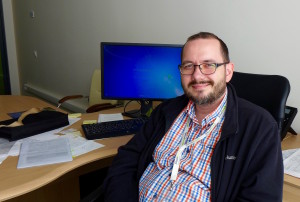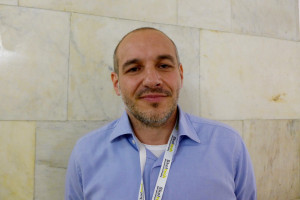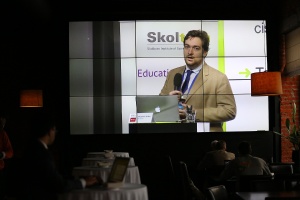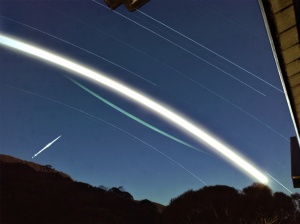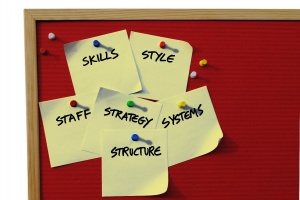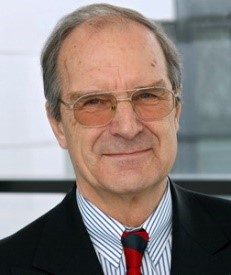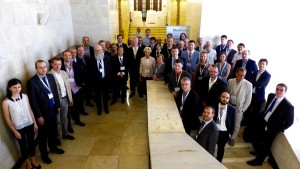 On May 30-31, the Skoltech Center for Energy Systems hosted its second international conference entitled: “Shaping research in integrated gas-, heat- and electric- energy infrastructures”. The conference was jointly organized with the International Institute for Energy Systems Integration (iiESI).
On May 30-31, the Skoltech Center for Energy Systems hosted its second international conference entitled: “Shaping research in integrated gas-, heat- and electric- energy infrastructures”. The conference was jointly organized with the International Institute for Energy Systems Integration (iiESI).
This conference is a continuation of the successful event that took place in June 2015, where the modern mathematical methods applied to energy systems were largely discussed. This year, the internationally invited experts from around the world shared their experiences and discussed the prospects for integration of thermal, gas and electric power systems.
The technical committee of the conference included prof. Janusz Bialek, Director of the Skoltech Center for Energy Systems, his colleagues: prof. Michael Chertkov and prof. Aldo Bischi, and prof. Mark O’Malley, Director of the Research Center for Electric Power, University College Dublin.
 During the first day and a half of the event ,the widely recognized scientists in the field from Russia, USA, Italy, Germany, Belgium, Denmark, UK, Ireland and Japan discussed the challenges and opportunities related to the integration of heat, gas and power infrastructures: Combined Cooling, Heat and Power (CCHP) units achieving higher efficiencies and lowering the environmental impact; fluctuating renewable energy sources as well as loads and prices; electric energy storage both conventional, e.g. electrochemical, and unconventional e.g. as synthetic fuels (hydrogen or synthetic methane) or as thermal energy via heat pumps; thermal energy storage both via buildings inertia and via dedicated heat storage tanks integrated in the district heating network; how to deal with emergencies and be sure to operate in a safe interval.
During the first day and a half of the event ,the widely recognized scientists in the field from Russia, USA, Italy, Germany, Belgium, Denmark, UK, Ireland and Japan discussed the challenges and opportunities related to the integration of heat, gas and power infrastructures: Combined Cooling, Heat and Power (CCHP) units achieving higher efficiencies and lowering the environmental impact; fluctuating renewable energy sources as well as loads and prices; electric energy storage both conventional, e.g. electrochemical, and unconventional e.g. as synthetic fuels (hydrogen or synthetic methane) or as thermal energy via heat pumps; thermal energy storage both via buildings inertia and via dedicated heat storage tanks integrated in the district heating network; how to deal with emergencies and be sure to operate in a safe interval.
 The 2nd half of the second conference day was devoted to discussion of the techno-economic aspects and integrated energy infrastructures practical challenges from industrial point of view. The R&D Center of Federal Grid Company presented their research activities as well as the multi-utility company IREN (Italy). IREN is active in more than ten EU projects and brought a real world example from the Turin district heating network integration with advanced heat storage configurations and consequent power plants flexibilization with emissions reduction. A representative from DNV GL (USA) gave a talk on modeling of gas compression station. Nomura Research Institute (Japan) and University of Bologna (Italy) spinoff, OPTIT were also present; the latter developing software for distributed power generation optimization. Also the non-commercial Association “NP Market Council”, the Design and Analytical Company “LORES”, the startup “Thermal Motors” LLC (co-founded by Skoltech student Dmitry Smirnov) and their colleagues from the Italian AB Gruppo, which will soon open an office in Moscow, participated in the so-called round table discussion to voice the existing barriers and opted potential solutions in achieving the full scale energy systems integration. The conference participants expressed their great interest in this area, highlighting its great practical importance.
The 2nd half of the second conference day was devoted to discussion of the techno-economic aspects and integrated energy infrastructures practical challenges from industrial point of view. The R&D Center of Federal Grid Company presented their research activities as well as the multi-utility company IREN (Italy). IREN is active in more than ten EU projects and brought a real world example from the Turin district heating network integration with advanced heat storage configurations and consequent power plants flexibilization with emissions reduction. A representative from DNV GL (USA) gave a talk on modeling of gas compression station. Nomura Research Institute (Japan) and University of Bologna (Italy) spinoff, OPTIT were also present; the latter developing software for distributed power generation optimization. Also the non-commercial Association “NP Market Council”, the Design and Analytical Company “LORES”, the startup “Thermal Motors” LLC (co-founded by Skoltech student Dmitry Smirnov) and their colleagues from the Italian AB Gruppo, which will soon open an office in Moscow, participated in the so-called round table discussion to voice the existing barriers and opted potential solutions in achieving the full scale energy systems integration. The conference participants expressed their great interest in this area, highlighting its great practical importance.
Professor Alexander Ustinov, Deputy Director of the Skoltech Center for Energy Systems: “For us, the conference is of interest because by it means we are implementing one of the Skoltech functions – attracting the international expertise. This year we were able to assemble the world’s leading experts in the field of energy systems. Moreover, not only theoreticians, but also industry professionals with practical experience. There were interesting reports made by colleagues from Denmark, USA, Italy and Japan. So, the experience of creation of small-scale integrated power systems with the use of local resources, shared by the colleagues from Europe, which may look as far from us at first glance is, in fact, relevant to a number of isolated settlements in Yakutia and the Far East.
Participation of the Russian companies’ representatives in the industrial part of the conference, which can be viewed as both the consumers of technologies and developers of the unique solutions, allowed us to get a clearer picture of the landscape that exists today in the world and a place in the development of integrated energy systems, which belongs to Russia. The industrial program of the conference, in addition to the mutual acquaintance with experience, is valuable because of making contacts that could lead to joint projects. For Skoltech, this conference is interesting by the fact that we are bringing expertise and funds. Our University is a good partner to enter to the Russian market for our foreign partners.”
Professor. Vittorio Verda, Polytechnic University Torino, Italy: “The field of my interests is design and modeling of district heating areas, including solutions in the field of thermal energy storage. This subject is very well developed in Russia and is important for me to share my knowledge in this field and to get acquainted with the opinion of colleagues. One could hardly find another such opportunity to meet in one place with a concentration of leading experts from the academic and industry practitioners and engineers. It is a good platform for the exchange of ideas and the emergence of joint research plans. For example, in the field of simulation of gas and electricity networks. If we talk about the fact that it was particularly interesting to me, it is, of course, attention and action that is paid to the reliability of the functioning of Russian district heating systems – we in the Mediterranean region do not have such developed and reliable systems, and we found here an interesting experience and good prospects for cooperation.”
According to Vladimir Shkatov, Deputy Chairman of the Board of the Association “Non-Commercial Partnership Market Council on the organization of an effective system of electric power wholesale and retail trade and power”: “It is obvious that the current state of energy puts on the agenda the issue of integration, since the division of systems is very expensive. Speaking of integration, we mean that it is desirable to design and operate the support systems (heat, gas, elector, water supply, transport and so on) on the basis of a common approach to the operation and design. At some point in time of the 1970’s, we have done just that. Now the question is more efficient use of all types of energy, synergy is particularly urgent. And this decision is no longer a technological aspect, as it was in the USSR, and the aspect related to the business and political components. For us, this conference is interesting because of the fact that there have been discussed both technical and business aspects of solutions to this problem. Besides, it is always interesting to look and hear the international experience. “
